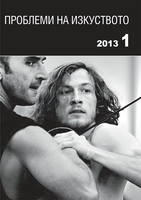Текстът, новият човек и актьорското тяло в тоталитарния театър
The Text, the New Man and the Actor’s Body in Totalitarian Theatre
Author(s): Joanna Spassova-DikovaSubject(s): Theatre, Dance, Performing Arts
Published by: Институт за изследване на изкуствата, Българска академия на науките
Summary/Abstract: The proposed text, which is part of a larger study on totalitarian theatre, discusses the connection between the text, the new man and the actor’s body in theatre during the late Stalinism in Bulgaria (1948-1953 – the year of Stalin’s death). In totalitarian state a very important role played theatre as far as with its specifics to keep a live link with the audience it was one of the crucial ways for imposing the totalitarian ideology. By acting the world of ideas and the material reality was bridged. The actor’s body as a „recording surface” became a broadly used device for visualization and dissemination of the official political strategies. On the stage the actors represented ideological schemes, prescribed in different normative party texts in the highly literature-centric totalitarian culture. In the paper special attention is paid to the construction of the image of the working man, since he was the brightest embodiment of the new man in the performances of socialist party drama on the stage of the Bulgarian National theatre. Some of the images of the enemy figure are also put into account. The survey is based on research and comparative analysis of critical reviews in the official periodicals: „Theatre”, „Labour Work”, „Literary Front”, „National Culture”, „National Youth”, „Evening News” and others, as well as of archival documents – transcripts of Arts Councils, interviews, diaries, memoirs, where rather contradictory information is given. The latter has to be reconsidered by theatre historians today.
Journal: Проблеми на изкуството
- Issue Year: 2013
- Issue No: 1
- Page Range: 34-37
- Page Count: 4
- Language: Bulgarian
- Content File-PDF

